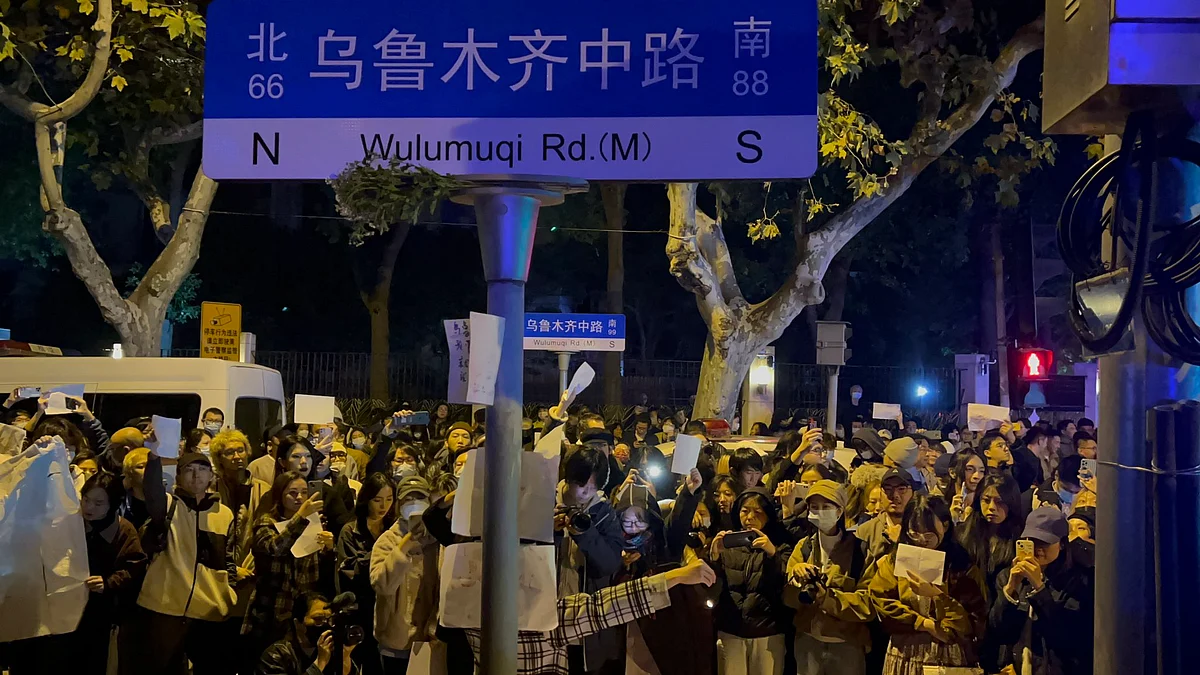'Xi step down' -Protests against COVID lockdowns intensify in china
China's rare public protests opposing stringent COVID lockdowns turned political on Sunday with protestors shouting slogans against President Xi Jinping and the ruling Communist Party

Protests against Chinese government's strict Covid measures have intensified with people taking to the streets against President Xi Jinping's harsh zero-Covid policy.
China's rare public protests opposing stringent COVID lockdowns turned political on Sunday with protestors shouting slogans against President Xi Jinping and the ruling Communist Party, as the demonstrations spread to the university campuses in Beijing and Nanjing.
Shanghai, where thousands of protestors converged at the Wulumuqi Road - which is named after Xinjiang provincial capital Urumqi - on Saturday night, witnessed fresh demonstrations on Sunday despite the heavy presence of police.
The protests, which began in the morning, intensified with the participation of hundreds of people by mid-afternoon, Thomas Hale, Correspondent of the Financial Times, who was present at the protest site, told BBC.
According to videos posted on social media about the protests in Shanghai, people were heard openly shouting slogans such as "Xi Jinping, step down" and "Communist party, step down", the BBC report said.
Hale said the protests are extremely significant as the politics of COVID policies reflected wider political frustrations including the slowing down of the economy.
Elsewhere protesters held blank white banners, while others lit candles and laid flowers for the victims in Urumqi, where 10 people were killed in a fire at a building reportedly under Covid lockdown on Thursday.
Observers say that the latest political protests appeared to be in continuation of "banner protest" in Beijing last month ahead of the CPC's once-in-a-five-year Congress which elected 69-year-old Xi for an unprecedented 3rd five-year term.
The anti-lockdown protests appear to be posing a major challenge for Xi, just over a month into his third term in power.
Political protests opposing the CPC and its leadership are very rare in China while the country witness sporadic agitations over various issues. As such criticism of the party and leadership could result in harsh penalties.
Videos posted on social media showed police arresting several protesters in Shanghai amid protests against their detention from the angry crowd.
Also, students' protests broke out in the prestigious Tsinghua University in Beijing as well as Communication University in Nanjing.
Photos and videos posted online showed students holding vigils for the Urumqi fire victims and launching protests at universities in Beijing and Nanjing.
Students said hundreds of people took part in one such demonstration in Tsinghua University where they held up blank sheets of paper - an act which has become a symbol of defiance against Chinese censorship.
One protester in Shanghai told the BBC that he felt "shocked and a bit excited" to see people out on the streets, calling it the first time he'd seen such large-scale dissent in China.
He said lockdowns made him feel "sad, angry and hopeless", and had left him unable to see his unwell mother, who was undergoing cancer treatment.
A female demonstrator said that police officers when asked how they felt about the protests, and the answer was "the same as you". But, she said, "they wear their uniforms so they're doing their job."
Shanghai, a city of over 25 million, endured weeks of COVID lockdowns in April sparking protests.
With protests over lockdowns of dozens of apartment buildings intensifying, the government stepped back on Saturday from enforcing lockdowns in Urumqi, the provincial capital of Xinjiang.
During the weekend, Urumqi witnessed a huge demonstration in which many Han Chinese nationals took part along with Uygur Muslims.
Urumqi authorities on Saturday said the city would lift coronavirus restrictions "in phases" after footage surfaced online showing rare protests against a three-month lockdown, Hong Kong-based South China Morning Post reported on Sunday.
In Beijing, people from several compounds, under lockdowns for days, also staged protests, leading to officials withdrawing the curbs.
Meanwhile, the National Health Commission on Sunday said 39,501 coronavirus cases, including 35,858 asymptomatic cases, were reported in the country by the end of Saturday as mass COVID tests were carried out across China to identify new clusters of infection.
It is for the fourth consecutive day that China reported an increase in cases, the highest since it recorded a sharp spike in cases in top cities like Shanghai in April.
Beijing has been a sharp escalation of cases, which on Sunday climbed to over 4,700, amid growing protests and unease in the city over lockdowns of dozens of apartment buildings. As of Sunday, the city has 9,694 cumulative confirmed cases.
At a meeting on Saturday, Beijing Communist Party secretary Yin Li urged lower-level officials to impose more resolute and decisive measures to contain the spread of the coronavirus, including transferring people who test positive and their close contacts to quarantine facilities.
Yin also inspected a makeshift hospital under construction in the Tongzhou district and urged officials to speed up construction, the Post report said.
Fear of Covid-19 has eased as people have learned from acquaintances that the symptoms are manageable. Instead, residents seem more worried about being infected in an isolation facility or staying with strangers in a large and messy makeshift center.
"I would rather stay at home and have a fever for a few days than stay in the hospital. It makes me sick just to think of the toilets," a Beijing office worker was quoted as saying by the Post.
Follow us on: Facebook, Twitter, Google News, Instagram
Join our official telegram channel (@nationalherald) and stay updated with the latest headlines